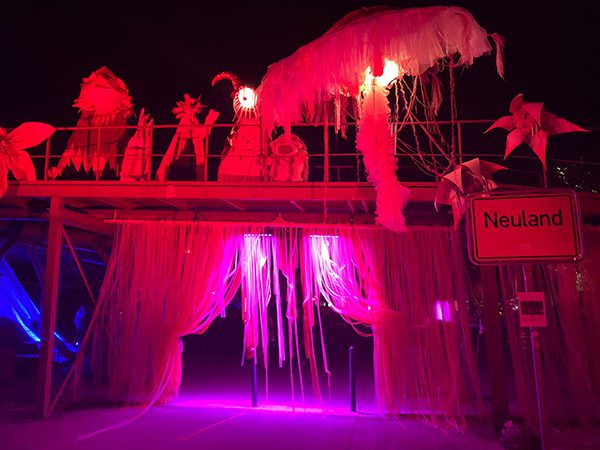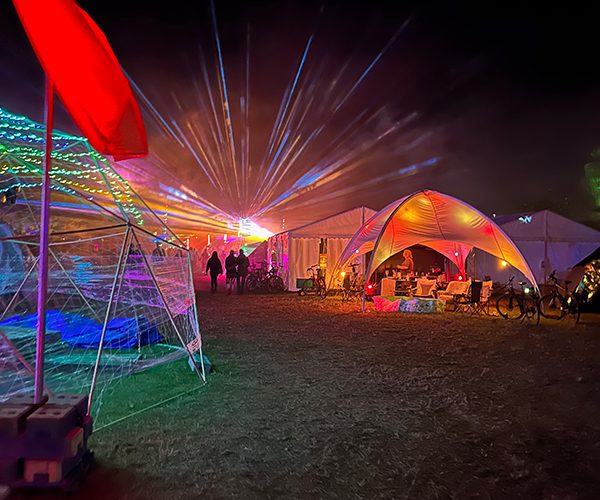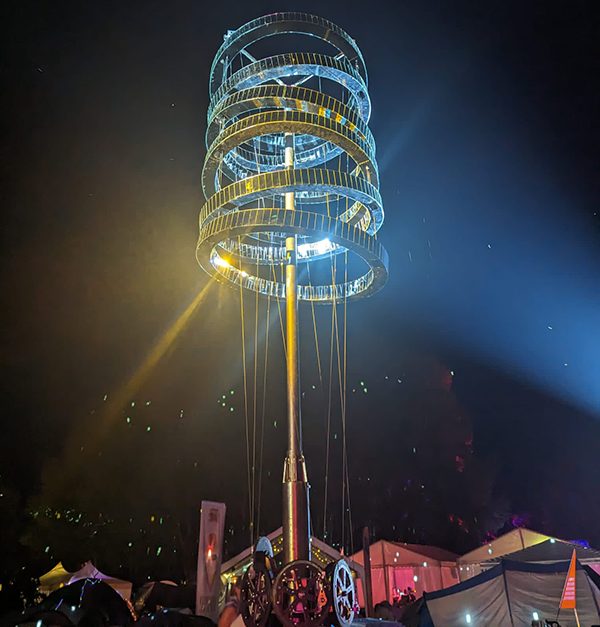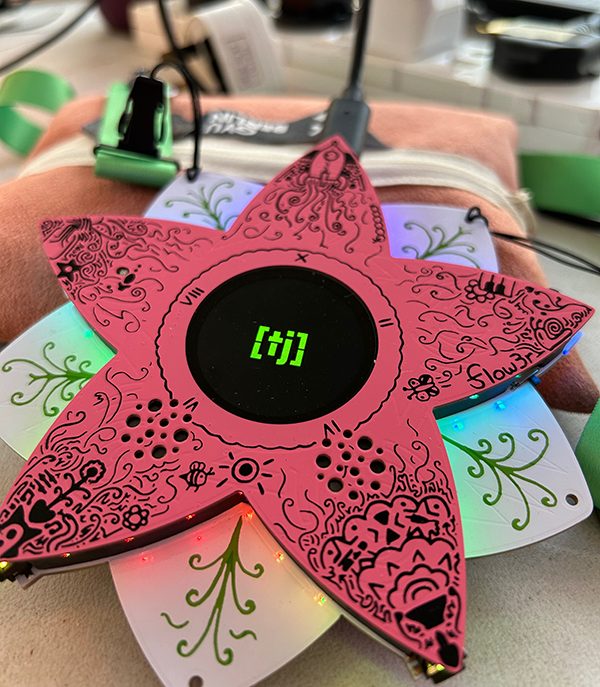By TOM JONES
It is a warm October, but I think this morning I saw the first frost of the year. Not that I am complaining about the weather (even if it is a national past time). Autumn is great, I get to wear hoodies again, and periods of sun are a nice surprise.

I spent a week of the summer in the hottest field on the planet.
Chaos Communication Camp (CCCamp) is a five-day long, outdoor, hacker festival run every four years in Germany by the Chaos Computer Club (CCC). 2023 saw the seventh incarnation of the event and the third that I have attended, starting with 2015 and 2019.
Hacker camps are remarkably difficult things to describe well, there is a sheer weight of force that comes with the event that is difficult to get across. The CCC at CCCamp gathered together 6,000 of Europe’s and the world’s hackers to celebrate Art, Culture, Society, the Environment and the continuing and ceaseless bothering of computers. We gathered together about an hour north of Berlin at Mildenberg Brick Work Park for 5 days in the middle of August.
Venue
The camp is a venue for discussions about technology and the impact it has on our lives. While that cover story is being digested, it is a great excuse to hang out and party in a field for a week, all while playing with computers new and old, radios, and an excess of different lighting systems.

The camp runs as a conference; there is a CFP and talks and workshops for all 5 days of the event. In a change from previous events, the running of talks and workshops was delegated out to sub communities at the camp. It turns out that no one really enjoys sitting in a giant blackout circus tent in 30°C weather—they prefer to be outside. The content team was a victim of the success of the AV team. With all talks both streamed live and recorded (see media.ccc.de to catch any talks you missed), there is little incentive to suffer the heat in person when you can be hanging out at the lake.
Like EMFCamp (which I covered in a trip report last year), CCCamp on the ground is formed of subgroups call Villages. Villages are the umbrella attendees and are expected to organize themselves. There are villages for local hackerspaces and regional CCC groups, villages for common hobbies such as amateur radio or hackware hacking, and for international groups such as the Italian Embassy or the Scottish Consulate.
Villages are a place where attendees can organize their own extra content beyond the conference main tracks. In 2023, the CCC decided to devolve main content into villages and divided the program into five sections to be primarily organized by villages with the support of the CCC’s logistical and volunteer machine.
Content
Talks and workshops were broken down by themes and hosted by villages in five areas: Bits und Baeume, Digital Courage, Milliways, N:O:R:T:X, and on the Marktplatz. Content was roughly broken down into themes. Bits und Baeume hosted talks and workshops on digitalization, technology, and environment in a breezy open tent midway out of the Brick Work, Digital Courage hosted a selection of digital rights content in German, and Milliways took on security-focused content and workshops on hardware.

Each of the stages was an open-air venue, each had a small selection of camo nets or tarps to provide shade and a little bit of shelter should rain roll through the site. Open-air venues were a great improvement on the sweltering circus tents from previous years. This style of tent is also used at EMFCamp, but the English weather is quite different to what you experience in Central Europe, and for EMFCamp, they are a much better fit.
The downside to the open-air venues is a lack of comprehensive shelter for attendees at talks. I avoided a couple sessions when I spotted that all the available shade had been taken by early attendees. When we did get our promised thunderstorm and subsequent rain, talks were cancelled and eventually rescheduled.
Content at CCC events covers an incredible range of topics, you could–if you wanted—learn about the environmental impact of modern computing and paths off of fossil fuels, create cyanotypes in the sun using seaweed and salt water, make a transceiver for LORA satellites, and—if you managed to find it after it was rescheduled–learn about repurposing “retired” rental e-scooters from a pair of puppets. The puppets put on an excellent show describing their exploits to take over the stock firmware and give waste devices a new life.
Scheduled content only ever scratches the surface of what happens at a CCC event, and a lot of the magic is occurring elsewhere. The Hardware Hacking village was on site again with their Hardware Hacking bus, a giant reused coach filled to the brim with workshop materials and soldering irons. The Hardware Hacking village runs non-stop workshops from 10AM everyday late into the night. They were so packed this time that they rejected workshops that were “too laptop”—giving them space to focus on taking things apart and making them up again.
Lights and Music
It is in the evenings when the site truly comes to life. Villages take darkness as a personal insult and have grown over the decades of the event, ever-increasing arsenals of LEDs, spotlights and lasers. As the sun sets, the event becomes filled with light shows, villages build on the conference’s music acts with their own speaker stacks and DJ sets.

The Brick Work has some buildings and central infrastructure that are co-opted to make impressive lighting installations. The chimney stack of the old factory had messages written on it with lasers every night. The central “hill” (an old observation and loading post in the factory) was loaded up with a dozen massive smoke machines that would blanket the area around the Marktplatz with a wall of smoke. This wall of smoke was then illuminated by lasers and spots. Walking through this with the lights and the smoke had the effect of making you pass through a thick wall with low visibility into an area where the smoke and the lights worked together to give the world an extra layer of depth.
There was even a giant disco ball floating in the middle of the lake.
To add to the lights and music, CCCamp once again came with an event badge. The badge itself is a fully featured microcontroller platform based on the ubiquitous ESP32, a high-speed dual core system with both WiFi and Bluetooth. From this base, the badge team created an interface board with a ton of capacitive touch inputs ringed with LEDs, a cool circular screen, speakers, and audio outputs.
The badge this year, Flow3r, is intended to be a music creation device. The past two events saw a smart watch and a Software Defined Radio. This year, there was a conscious move towards making technology more accessible and fun. The badge has two audio output jacks and speakers and shipped with a couple of demos which were themselves excellent music toys.
With this accessibility, the badge enables a ton of power. The Flow3r badges support being networked together with IPv6 over the audio jacks, a step beyond using the microcontrollers’ Wifi or Bluetooth.
Building on years of cool badges for which it was hard to write software in a field due to complicated tool chains, Flow3r is running MicroPython. MicroPython makes it easy for anyone in a field to connect to the device via USB serial and start hacking and playing with the inputs and outputs. While there, I saw someone write their first program ever and get the LEDs on the badge to start playing.
The badges always lead to cool hacks, and this time was no different. Hacker camps in Europe have started to work together to ensure that the badges are not just e-waste after the event. Badge.team created a reasonably stable interface so that software written in MicroPython is easy enough to move between badges, and there is an app store to make it easy to install apps others have made onto your badge. One app in the default firmware for badges is a name display, and at night you can see hundreds of people walking around wearing their badges showing their name. You also see other name apps beyond the default one on those that have written a name display of their own or downloaded one they thought was cool.
My Third Camp
This was my third time at a CCC-run outdoor camp. When events are every four years, you get a weird pacing with the people you meet. Somehow, we are able to make solid friendships in just 5 days. With this being my third visit, I’m now meeting people I first met in 2015 at my first camp for the third time. Somehow, we have known each other for 15 days, but over 8 years that creates an incredibly strong friendship. I was introduced to new partners of friends, told about children, and got the chance to introduce old friends to my wife as she experienced her first German camp.

After a busy summer organizing my wedding, CCCamp was a chance to relax a little bit. I did my best to avoid running events but plans frequently fail to survive contact. A friend through the fediverse helped me host Lukas from the MNT Reform (https://mntre.com) Project run a show and tell of the Open Hardware Arm64 laptops he builds. This was a first chance for many people to try the laptop and get a preview of their upcoming 7-inch pocketable (if you have large pockets) laptop. The first devices should ship early in 2024, but the prototype hardware was excellent to play with bugs and all.
Failing to repress my growing reputation as “That Scottish Person,” I ended up MC’ing a Whiskey drinking event. But as I am learning, I will take any chance I get to inflict Scots Poetry on a crowd. This time reading a snippet of Burns to what must have been 1,000 people eagerly holding up while I read a few lines of the Bard.
“To sing thy name!”
Go Somewhere
It must be a constant refrain of trip reports that the value of the event is difficult to describe to others afterwards. I can sing the praises of the things that happened, but I’m not sure the enjoyment of filling out an Austria complaint form at a pop-up booth at the side of a road really comes through. Their filling system did sound awfully like a shredder.
The main character of CCCamp 2023 for me was the heat. Germany had been hit by an oppressive summer heat wave, and, honestly, if you asked me about the event before I wrote this, that would have been all I talked about. Sure, my blackout tent helped me sleep a little later, and hiding in the shade in front of an artificial draft helped me sit and write a silly app for the badge.
The heat created new experiences I wouldn’t have gotten without it.
On the fourth day, to avoid being cooked, I was swimming alone in middle of the lake when I came across an inflatable boat with some of the EMFCamp folk in it. They invited me aboard, which I managed—only flooding their vessel a little—and we shared gin and tonic from a can while bobbing around on the lake.
I’m not sure how you get that experience without joining us at an event.


